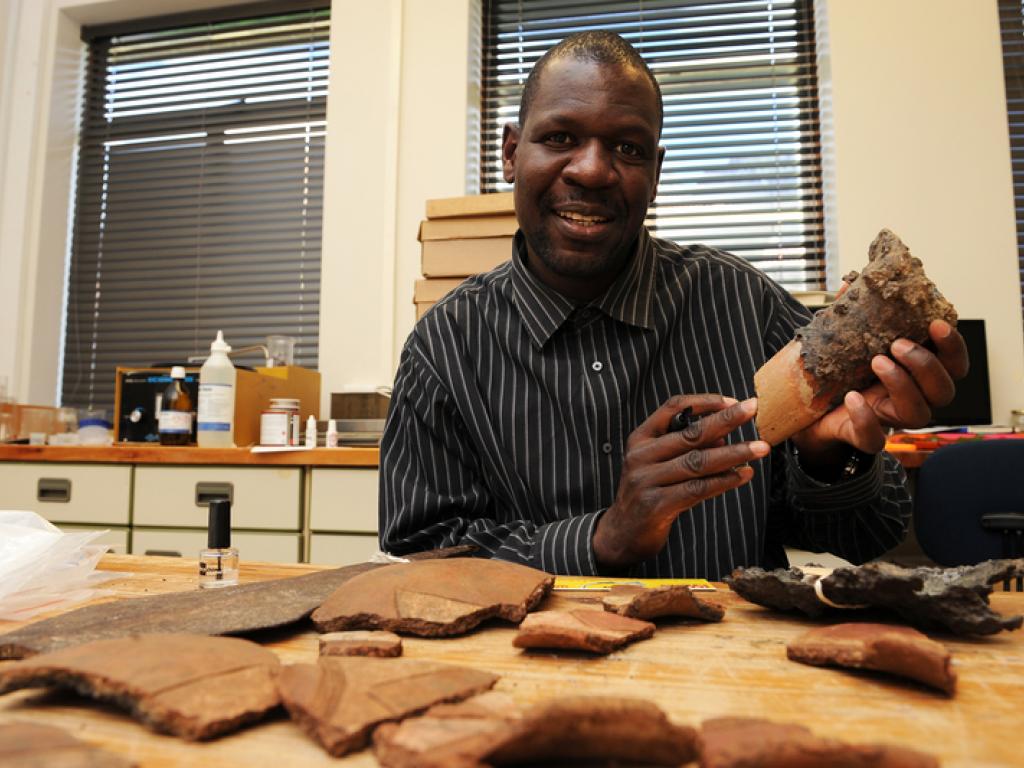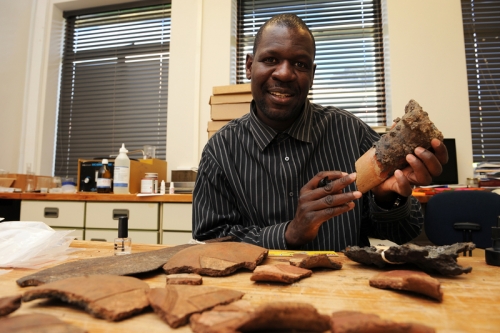Science Faculty researcher awarded Global Professorship


Professor Shadreck Chirikure, head of the UCT Archaeological Materials Laboratory, is among the first cohort of scholars to be awarded a Global Professorship by the British Academy.
Professor Shadreck Chirikure, head of the University of Cape Town (UCT) Archaeological Materials Laboratory, has won a Global Professorship from the British Academy for his work dating historical artefacts and the study of pre-colonial urban societies in Africa. The award provides the opportunity for internationally recognised scholars working in the social sciences and humanities to relocate to the United Kingdom (UK) for four years and continue their research at a British university. Chirikure will soon take up his place at the University of Oxford’s School of Archaeology.
“When I heard the news I was ecstatic,” says Chirikure. “It is wonderful recognition of my work. But beyond this, I believe it also comes with a great deal of responsibility.”
The Global Professorships, which aim to demonstrate the UK’s commitment to international research partnerships, have been awarded to scholars from seven countries: Australia, Chile, France, Ghana, South Africa, Spain and the United States.
“My hope is that this award will mean we can really focus on the development of students working in the field, especially in previously disadvantaged institutions such as the University of Venda, the University of Limpopo and institutions in Mozambique, for example.”
In Chirikure’s view, the professorship provides the opportunity to raise the profile of African archaeology at the University of Oxford and leverage the available resources to support other young African scholars.
“My hope is that this award will mean we can really focus on the development of students working in the field, especially in previously disadvantaged institutions such as the University of Venda, the University of Limpopo and institutions in Mozambique, for example.
“I think this can support the development of a new cohort of African archaeologists.”
Beyond the possibility for student development, Chirikure is most excited about the prospect of collaborating with other researchers and thinkers at the University of Oxford. “I am greatly looking forward to having access to such a deep reserve of archives, research technology and laboratories,” he says.
Chirikure plans to continue his work looking at pre-colonial urban society in southern Africa over the course of his four-year tenure at Oxford. “I am excited at the prospect of addressing questions that lie at the intersection of human community, food and landscape,” he says.
“I am particularly keen to explore the deep history of food and food security, including looking at food residues found in pots, which can tell us a great deal, including about the specific species of vegetables and grains being used, diets and levels of nutrition.”
At present, Chirikure is head of UCT’s Archaeological Materials Laboratory. This laboratory is Africa’s only facility dedicated to the study of pyrotechnology – the use of fire to enhance everyday life – practiced by farming communities of the past 2 000 years in sub-Saharan Africa. It employs a modern materials science approach to the study of the history of African indigenous technology.
“I am particularly keen to explore the deep history of food and food security, including looking at food residues found in pots, which can tell us a great deal, including about the specific species of vegetables and grains being used, diets and levels of nutrition.”
“The lab studies a wide variety of pyrotechnical materials,” explains Chirikure. “They include metal objects, ceramics, slags, plasters and glass beads. These materials come from all over the African continent, from as far afield as Malawi, Cameroon and Nigeria, including from some of the continent’s most famous sites like Great Zimbabwe, Mapungubwe and Khami.”
The research facility currently focuses on three projects: investigating the role of mining in early state formation, modelling the evolution of pyrotechnology within the past 2 000 years in sub-Saharan Africa, and exploring innovation and demography in the evolution of socio-technical systems.
Over the course of his career, Chirikure has developed a fascination with pre-colonial society and technology. But when he was a young child, the field of archaeology almost lost him to the world of finance.
“Growing up in a rural setting, I remember a talk given by someone selling insurance policies. The idea really fascinated me that if you had cattle and you lost them to drought, there was a system that would allow you to restock,” he says. This fascination almost led to Chirikure to choose accounting as his field of study.
“For me, the main issue is always to bring in new techniques and new ways of looking at old problems. So, in four years’ time, I want to be able to see a difference.”
“As it turned out, I didn’t get into that programme as an undergraduate. Of course, now I look back and feel very grateful that my fate brought me to the field of archaeology.”
Instead Chirikure obtained an MA degree in artefact studies, and later, a PhD exploring the technology and socio-cultural metaphors associated with pre-colonial iron production in southern Africa from the University College London.
As he prepares to return to the UK, Chirikure is clear how he will measure the success of his four-year tenure at Oxford. “For me, the main issue is always to bring in new techniques and new ways of looking at old problems. So, in four years’ time, I want to be able to see a difference.”
“I hope there will be more student development, more research and more collaboration. Then I will be a happy man.”
Story: Ambre Nicolson
Photo: Michael Hammond
